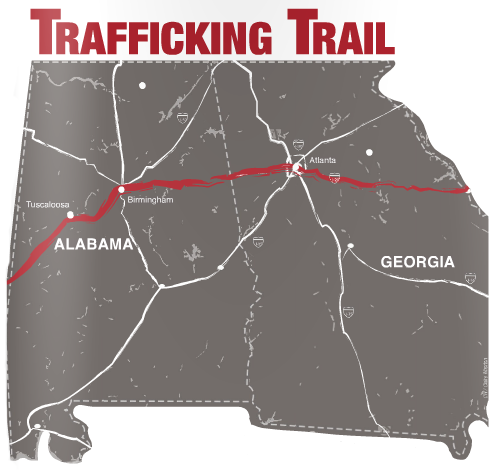Some people in the United States believe slavery in this country ended over 150 years ago, but sex trafficking has only continued to grow. Trafficking occurs right in Alabama’s backyard, with cases reported in Montgomery, Dothan, Huntsville, Mobile and Birmingham. In fact, I-20, particularly the 147-mile stretch from Birmingham to Atlanta, is the top sex trafficking highway in the United States. Victims are taken to and from hubs located between Dallas and the East Coast and are forced to participate in various areas of the sex industry including escort services, massage parlors, street prostitution, pornography and strip clubs.
While some argue that those in the sex industry are choosing to participate in these acts on their own, some of them have no say in the matter.
Tajuan McCarty is the founder of The WellHouse, a safe house for rescued victims of human trafficking in Birmingham. She said no one in their right mind would choose this life for themselves and most are stuck in it because they were dragged into it by boyfriends, drug addictions or a need to provide for their children.
McCarty is a former victim – when she was 15 years old she said her “boyfriend turned pimp” began trafficking her. She said Birmingham is a hot spot for traffickers as it links major hubs like Atlanta, New Orleans and Nashville. She was trafficked to Birmingham so often that she said she began to call this place home.
Once she was rescued, McCarty remained in Birmingham and, in 2010, created a 24-hour crisis line and rescue program. Today, The WellHouse serves as a refuge for women rescued from trafficking with the goal of eventually reintegrating these women back into society. These women are provided counseling, identification, life skills and education, all free of charge. In 2013, she was recognized by the FBI with the Community Leadership Award for her work and her dedication in her fight against human trafficking.
The WellHouse has rescued women from across the country who have been trafficked into Alabama. These women have been saved from a number of different places, including local universities, clubs and parties.
“We have even rescued a girl from the same home in Birmingham that I was rescued from 25 years ago,” McCarty said.
She said victims are not limited to runaways or abducted children, but they are often girls from affluent areas.
“There is a misconception about the socioeconomic status of these victims,” McCarty said.
The vast majority of the victims in the U.S. had no intention of getting into the sex industry, but through modeling, a boyfriend or out of desperation they found themselves being exploited and used, living in an earthly hell, McCarty said.
“Until we change our perspective on trafficking and the victims of it, this will continue,” she said.
Another key player in the fight against human trafficking in Alabama is Representative Jack Williams from Vestavia Hills, Alabama. He is the chair of the Alabama Human Trafficking Task Force, which helps to combat, prevent and create awareness of human trafficking.
“What we are trying to do is create an atmosphere in the state where victims can get help and also have an open and honest discussion about what’s going on so we can stop this,” he said.
End It Alabama, a program of the Alabama Human Trafficking Task Force, hosted a summit at the end of January to educate law enforcement and attorneys on how to better handle human trafficking in the state. They brought in experts from the FBI and the Department of Homeland Security to better equip local officials to deal with and recognize victims.
Williams also sponsored a law in 2010 to protect victims, particularly minors, from being arrested.
“Our goal is to focus on those who victimize, not the victims themselves,” he said.
Maggie Snead, a junior majoring in human environmental science, is president of the University’s chapter of the International Justice Mission, an organization that works to combat modern-day slavery, which human trafficking is sometimes called.
“So many people think it’s a thing of the past, but slavery is bigger than it’s ever been,” she said.
McCarty, Williams and Snead all encouraged students to get involved in stopping human trafficking.
“When folks fall victim to this crime, they have to be walked out of it,” Williams said. “They can’t do it alone.”
To find out more about human trafficking in Alabama, visit thewellhouse.org, enditalabama.org or alabamaijm.com.









